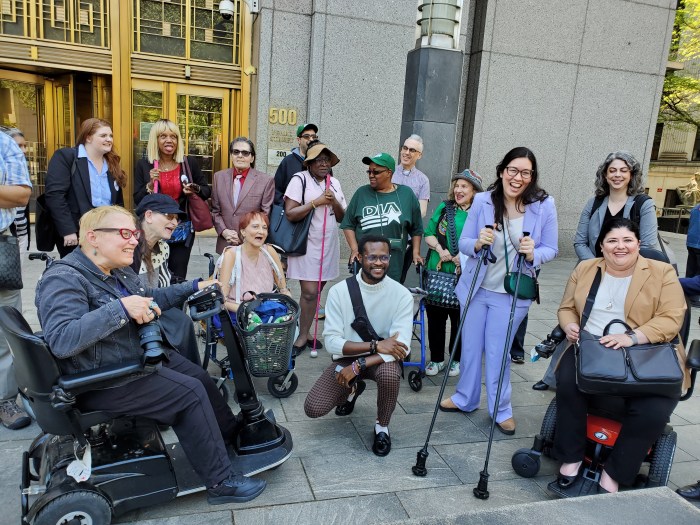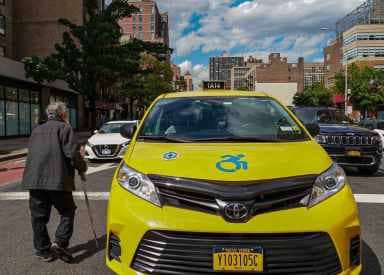Disability advocates are fuming as city officials plan to upend a major accessibility program that helps thousands of disabled New Yorkers get to jobs, schools and other vital appointments, amNew York Metro learned on Wednesday.
Advocates said the NYC Taxi & Limousine Commission (TLC) wants to shut down the Accessibility Dispatch program to save money. They added that the program is important because it helps wheelchair users, visually impaired people and other disabled New Yorkers get around the city by calling or using an app to order an accessible taxi in advance of their trip.
In a letter to NYC Mayor Eric Adams on Jan. 14, more than a dozen disability groups urged the city not to end Accessible Dispatch, which costs about $6 million annually to operate.
“We write to urge you to reverse the TLC’s plans to end Accessible Dispatch, which is a lifeline for some New Yorkers with disabilities,” the letter stated. “The TLC’s proposal runs directly counter to your goal of increasing disability employment and independence for people with disabilities.”
But TLC officials said the agency is not calling it quits on Accessibility Dispatch, but “streamlining and transitioning” it. The reason, they said, is to move away from a single-contract model to a program serviced by multiple TLC-licensed e-hail providers such as Curb, Arro Myle, all in an effort to enhance the existing system by giving riders more options for rides.
The change is in addition to a court settlement that mandates the 50% of TLC’s taxi fleet be wheelchair accessible by March 31, 2025.
Companies like these already provide 2,000 wheelchair-accessible vehicle-requested trips on a monthly basis, TLC officials reported.

TLC chair David Do said Accessible Dispatch is an important lifeline for people with disabilities, adding that the upcoming changes will improve service for riders.
“We understand the concern associated with any change in a system that people have been using for years,” Do said in a statement to amNew York Metro. “Our commitment to accessibility is unwavering, which is why we are transitioning to a new, more cost-effective system that reflects improvements in technology and provides more options than ever.”
But Jean Ryan, president of the advocacy group, Disabled in Action, is skeptical. She expressed her concerns about having multiple companies involved in an accessibility program. She said it is important that people who operate the program “understand people with disabilities” and are easy to talk to.
“Being patient and helpful and easy to reach is not anything we have experienced from individual vendors phone lines where we have been prevented from calling back, sent the wrong vehicle and treated with impatience” she said during a Wednesday hearing about the program. “We need a service that we can call back if the vehicle doesn’t show up or if we can’t find it or if they send the wrong kind of vehicle.”
Joe Rappaport of the Brooklyn Center for Independence of the Disabled shared similar concerns about allowing private companies to support accessible-ride programs.
“The TLC has merely said it’ll rely on Uber and Lyft, etc., to set up their own programs, but it’s unlikely they’ll work as well as the current system,” he said. “People need to call back if they cannot get to or find the vehicle, and with Accessible Dispatch, they now can call back if there is a problem and get a live person to follow-up with on what is happening in real time. With Accessible Dispatch, riders can do this. Why replace it?”
But Do of the TLC said efficient customer service will not change going forward.
“The most critical element of Accessible Dispatch—the ability to speak with a human being when you need a ride—will not change,” he said.
Another TLC goal is to help medallion owners get wheelchair-accessible vehicles on the road by redirecting Taxi Improvement Funds, created in 2014.
Meanwhile, Rappaport, along with many other advocates, doubled down on the importance of Accessible Dispatch.
“No matter whether the true cost of Accessible Dispatch is $3 million or $6 million, this is a small amount of money for a program that is a life-saver for many disabled New Yorkers,” he said.
